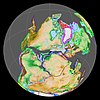Subachoque Formation
| Subachoque Formation | |
|---|---|
| Stratigraphic range: Early to Mid Pleistocene ~ | |
| Type | Geological formation |
| Underlies | Sabana Formation |
| Overlies | Tilatá Formation Guadalupe Gp. Guaduas Fm., Cacho Fm., Bogotá Fm., Regadera Fm. |
| Thickness | up to 150 metres (490 ft) |
| Lithology | |
| Primary | Shale, lignite |
| Other | Sandstone |
| Location | |
| Coordinates | 4°57′17.3″N 74°13′07.5″W / 4.954806°N 74.218750°W |
| Region | Bogotá savanna, Altiplano Cundiboyacense Eastern Ranges, Andes |
| Country | |
| Type section | |
| Named for | Subachoque |
| Named by | Helmens & Hammen |
| Location | Subachoque Synclinal |
| Year defined | 1995 |
| Coordinates | 4°57′17.3″N 74°13′07.5″W / 4.954806°N 74.218750°W |
| Region | Cundinamarca |
| Country | |
 Paleogeography of the Pleistocene by Ron Blakey | |
The Subachoque Formation (Spanish: Formación Subachoque, Q1su) is a geological formation of the Bogotá savanna, Altiplano Cundiboyacense, Eastern Ranges of the Colombian Andes. The formation consists mainly of sandy shales and lignite with sandstone beds. The Subachoque Formation dates to the Quaternary period; Early to Middle Pleistocene epoch (from approximately 2.5 to 1 Ma), and has a maximum thickness of 150 metres (490 ft). It is the lowermost formation of the lacustrine and fluvio-glacial sediments of Lake Humboldt.
Etymology
[edit]The formation was first defined and named by Helmens and Van der Hammen in 1995 after Subachoque, Cundinamarca.[1]
Description
[edit]Lithologies
[edit]The Subachoque Formation consists mainly of sandy shales, some organic, with lignite and sandstone beds.[1]
Stratigraphy and depositional environment
[edit]The Subachoque Formation is the lowermost of the lagunal and alluvial sequence of the Bogotá savanna. In parts, it conformably overlies the Tilatá Formation and other parts unconformably the Cretaceous Guadalupe Group and the Paleogene Guaduas, Cacho, Bogotá, and Regadera Formations. The Subachoque Formation is overlain by other Quaternary deposits of Lake Humboldt. The age has been estimated to be Early to Middle Pleistocene based on fission track analysis, with reported ages between 2.5 and 1 Ma.[2] The depositional environment has been interpreted as lacustrine and fluvio-glacial with alluvial fans.[1]
Outcrops
[edit]The Subachoque Formation is found at its type locality in the western flank of the synclinal of Subachoque and in the western flank of the synclinal of Guasca.[1] The deposition of the Subachoque Formation postdates the main reverse movement of the Bogotá Fault.[3]
Regional correlations
[edit]- Legend
- group
- important formation
- fossiliferous formation
- minor formation
- (age in Ma)
- proximal Llanos (Medina)[note 1]
- distal Llanos (Saltarin 1A well)[note 2]
See also
[edit]Notes
[edit]References
[edit]- ^ a b c d Montoya & Reyes, 2005, p.69
- ^ Montoya & Reyes, 2005, p.71
- ^ Geological Map Bogotá, 1997
- ^ a b c d e f García González et al., 2009, p.27
- ^ a b c d e f García González et al., 2009, p.50
- ^ a b García González et al., 2009, p.85
- ^ a b c d e f g h i j Barrero et al., 2007, p.60
- ^ a b c d e f g h Barrero et al., 2007, p.58
- ^ Plancha 111, 2001, p.29
- ^ a b Plancha 177, 2015, p.39
- ^ a b Plancha 111, 2001, p.26
- ^ Plancha 111, 2001, p.24
- ^ Plancha 111, 2001, p.23
- ^ a b Pulido & Gómez, 2001, p.32
- ^ Pulido & Gómez, 2001, p.30
- ^ a b Pulido & Gómez, 2001, pp.21-26
- ^ Pulido & Gómez, 2001, p.28
- ^ Correa Martínez et al., 2019, p.49
- ^ Plancha 303, 2002, p.27
- ^ Terraza et al., 2008, p.22
- ^ Plancha 229, 2015, pp.46-55
- ^ Plancha 303, 2002, p.26
- ^ Moreno Sánchez et al., 2009, p.53
- ^ Mantilla Figueroa et al., 2015, p.43
- ^ Manosalva Sánchez et al., 2017, p.84
- ^ a b Plancha 303, 2002, p.24
- ^ a b Mantilla Figueroa et al., 2015, p.42
- ^ Arango Mejía et al., 2012, p.25
- ^ Plancha 350, 2011, p.49
- ^ Pulido & Gómez, 2001, pp.17-21
- ^ Plancha 111, 2001, p.13
- ^ Plancha 303, 2002, p.23
- ^ Plancha 348, 2015, p.38
- ^ Planchas 367-414, 2003, p.35
- ^ Toro Toro et al., 2014, p.22
- ^ Plancha 303, 2002, p.21
- ^ a b c d Bonilla et al., 2016, p.19
- ^ Gómez Tapias et al., 2015, p.209
- ^ a b Bonilla et al., 2016, p.22
- ^ a b Duarte et al., 2019
- ^ García González et al., 2009
- ^ Pulido & Gómez, 2001
- ^ García González et al., 2009, p.60
Bibliography
[edit]- Montoya Arenas, Diana María; Reyes Torres, Germán Alfonso (2005), Geología de la Sabana de Bogotá, INGEOMINAS, pp. 1–104
Maps
[edit]- Buitrago, José Alberto; Terraza M., Roberto; Etayo, Fernando (1998), Plancha 228 - Santafé de Bogotá Noreste - 1:100,000, INGEOMINAS, p. 1, retrieved 2017-06-06
- Various, Authors (1997), Mapa geológico de Santa Fe de Bogotá – Geological Map Bogotá – 1:50,000 (PDF), INGEOMINAS, p. 1, retrieved 2017-03-16
Further reading
[edit]- Guerrero Uscátegui, Alberto Lobo (1992), Geología e Hidrogeología de Santafé de Bogotá y su Sabana, Sociedad Colombiana de Ingenieros, pp. 1–20
External links
[edit]- Gómez, J.; Montes, N.E.; Nivia, Á.; Diederix, H. (2015), Plancha 5-09 del Atlas Geológico de Colombia 2015 – escala 1:500,000, Servicio Geológico Colombiano, p. 1, retrieved 2017-03-16


























